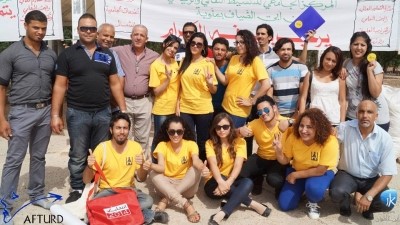Context:
Tunisia has a population of 11.107 million and GDP US$43.015 billion. Youth constitute 12.3% of the total population and 17.5% of the working-age population. While unemployment rate is 14.8%, unemployment among female youth (21.2%) is higher than that among male youth (12.5%). One substantial obstacle for finding a good job is the mismatch between requirements of the job and qualifications of applicants. The average educational attainment in Tunisia is 8.4 school years. Only 10% of Tunisian youth had volunteered in an organization in 2015.
Mosharaka is designed to help Tunisian youth to participate more effectively in the promotion of democracy, equality, fundamental rights and freedoms. Mosharaka builds on the vital role played by youth in Tunisia and helps to integrate young people to participate more effectively and actively to promote human rights, democracy and freedoms in their societies. The methodology of the project is based on the participatory approach to human rights education to plan, implement and evaluate all activities, and to involve all partner organizations, youth aged 15-29, civil society organizations, governments, policy makers, legislators and clergy at all stages of the project.
Implementation of programme/ initiative:
Mosharaka is implemented by the International Centre for Human Rights Education – Equitas, a Canadian non-governmental and non-profit organization, and is funded by the European Union and the Ford Foundation. The purpose of the Mosharaka is to build youth networks and capacities in the MENA region to promote youth mobilization and participation in the promotion of human rights and democracy, and to prepare young people, women and civil society organizations to use human rights standards, mechanisms and methods to promote equality, diversity and non-discrimination and access to justice for young people.
More specifically, the project aims to:
– Strengthen the capacity of youth leaders (especially young women and those most vulnerable to marginalization and discrimination) to use international human rights standards, mechanisms and approaches, to engage in effective community action at the national and regional levels to promote participation and protect and defend youth rights
– Strengthen the capacity of civil society organizations to mobilize youth and support their efforts to promote democratic participation and the promotion of fundamental rights and freedoms
– Increase the awareness, participation and involvement of youth, the general public and decision-makers with regard to the human rights of young people, specifically those who are marginalized and most vulnerable to discrimination.
Main challenges:
Some of the challenges faced while conducting the workshops included:
- The ambitious expectations of participating youth exceeded the objectives of the workshops
- Difficulty in agreeing on the topic of the workshop due to the presence of diverse ideas and suggestions
- Time limitations
- Need of guidance
- Withdrawal of one of the youth leaders
Results achieved:
Members of Mosharaka project launched “Forsa” initiative in the form of a short documentary to promote social integration and spread awareness on the drug phenomenon among 200 young men and women. The initiative also included three workshops in the city of Tunis and three workshops in the city of El Kef under the following themes: youth participation, citizenship, human rights, and social inclusion. In addition, the initiative organized a national training on promoting regional youth networks to ensure human rights and participatory democracy in the MENA region, targeting 24 youth (63% females). Finally, the initiative conducted a capacity building training for 50 youth with disabilities to promote their social integration.
Members of Mosharaka project also lunched “Wassel Sotek” initiative to promote the participation of youth in municipality elections and public life. The initiative included a workshop on local governance targeting 20 youth leaders from Tunis and El Kef cities.
Moving Forward:
The members of Mosharaka are working on developing a Training Toolkit based on their experience in Forsa and Wassel Sotek initiatives.
Replicability:
Mosharka is implemented through 20 projects by 30 civil society organizations in 10 communities of 5 Arab countries. Mosharka involved 173 youth leader, engaged 1661 young persons and reached a total of 16,675 youth in the targeted communities.
References:
AHDR 2016
Women’s school-to-work transition in the Arab Mediterranean countries, 2017
OECD Youth in the MENA region, 2016
World Bank, 2016
International Labor Organization, 2016
Report of the national workshop on enhancing youth participation in public issues and decision making in Tunisia
Project Details
Date: October 12, 2017
